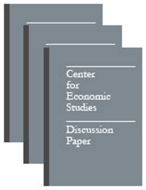Technology Use and Worker Outcomes: Direct Evidence from Linked Employee-Employer Data
Technology Use and Worker Outcomes: Direct Evidence from Linked Employee-Employer Data
Abstract
We investigate the impact of technology adoption on workers’ wages and mobility in U.S. manufacturing plants by constructing and exploiting a unique Linked Employee-Employer data set containing longitudinal worker and plant information. We first examine the effect of technology use on wage determination, and find that technology adoption does not have a significant effect on high-skill workers, but negatively affects the earnings of low-skill workers after controlling for worker-plant fixed effects. This result seems to support the skill-biased technological change hypothesis. We next explore the impact of technology use on worker mobility, and find that mobility rates are higher in high-technology plants, and that high-skill workers are more mobile than their low and medium-skill counterparts. However, our technology-skill interaction term indicates that as the number of adopted technologies increases, the probability of exit of skilled workers decreases while that of unskilled workers increases.




